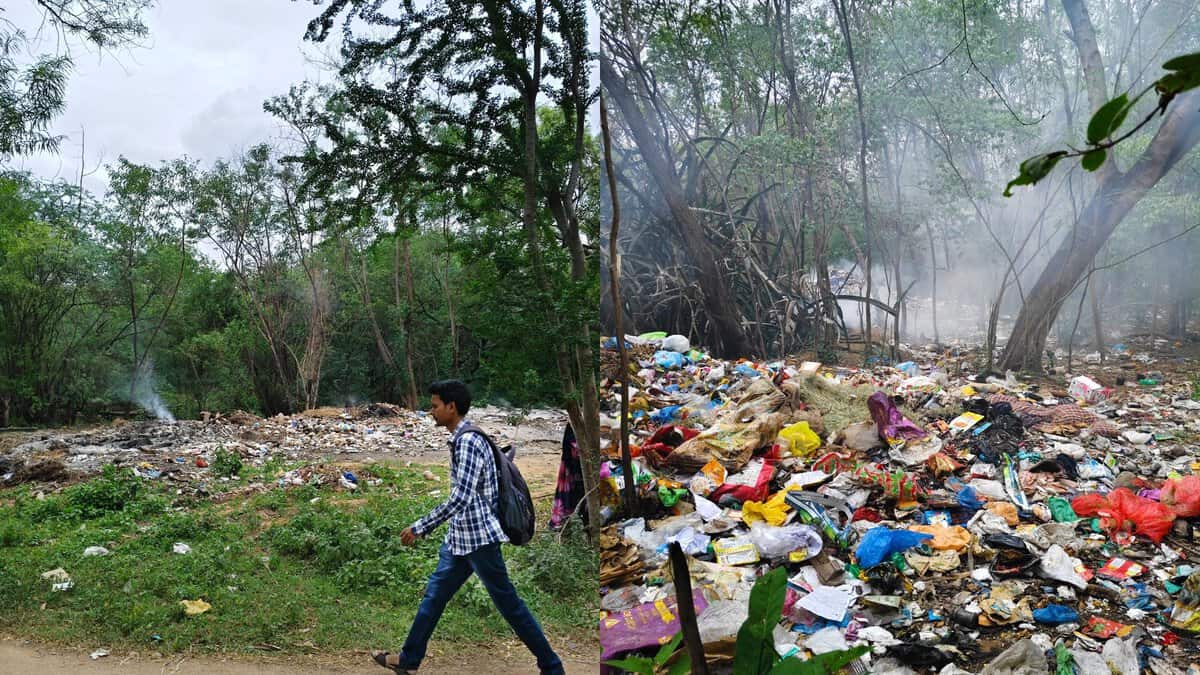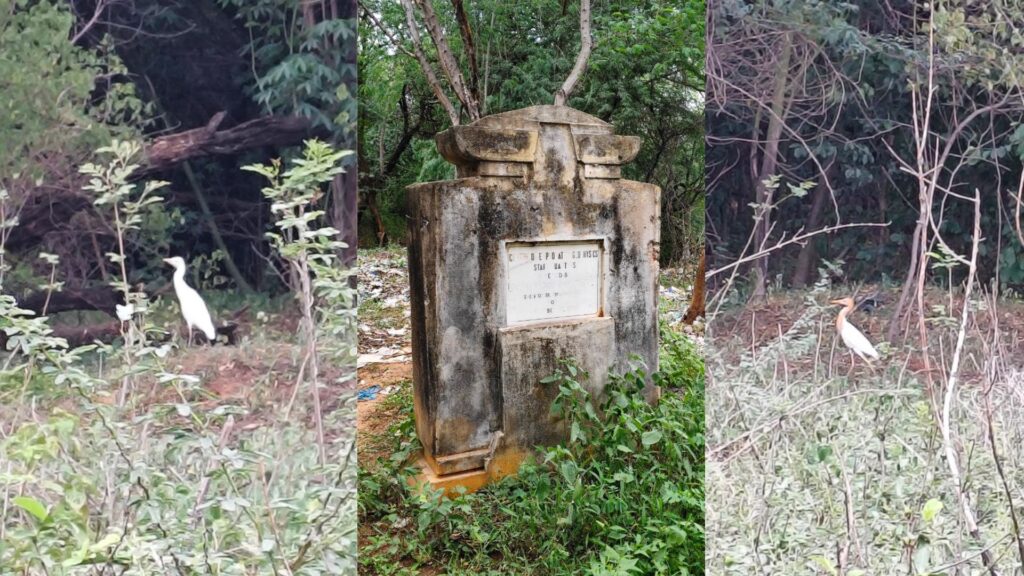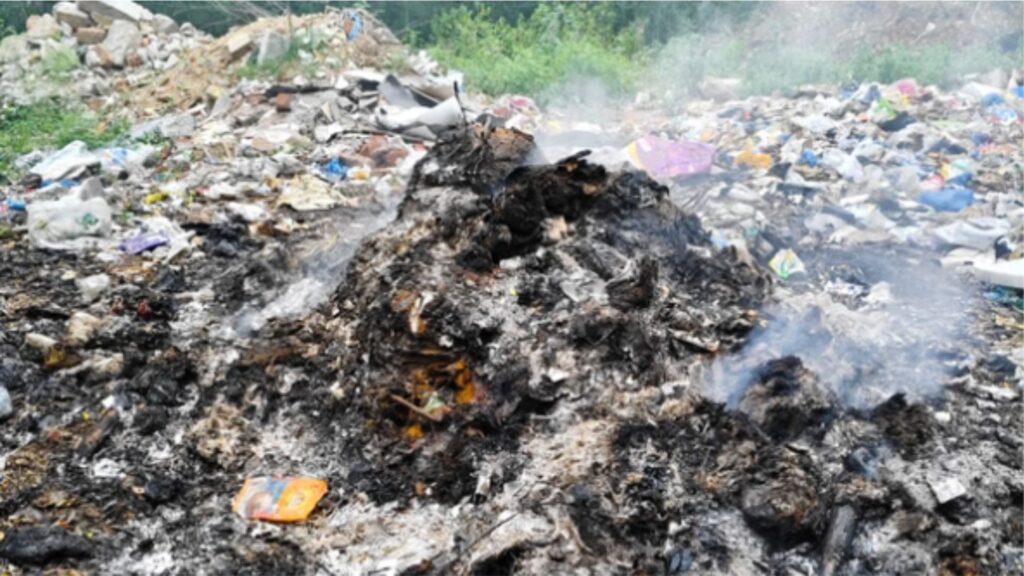
Hyderabad: Osmania University is known for its lush green natural forest and biodiversity. The sanitation and gardening staff play a key role in maintaining cleanliness on the campus. Despite all the efforts of the university administration to keep the premises clean, solid waste management has become a major challenge for the institution.
Tonnes of garbage could be seen dumped inside the campus’s forest area close to the Press and Publications department, by the side of a narrow muddy road, the shortcut connecting the campus with Habsiguda.
The garbage which is mostly solid, could be seen set on fire, with smoke engulfing the serene inhabited by peacocks, snakes, cranes, and all its biodiversity.
According to Shareef, a resident of one of the basthis located inside the campus, all the garbage is generated from the hostels located inside the campus, which is collected by the sanitation staff of the university and dumped there.
There are 34 contract workers engaged in collecting the waste from across the campus, who use a tractor and a mini garbage collection van.
When asked, one of the sanitation staff told Siasat.com that presently, they were collecting the garbage and dumping it inside the woods.
Dumping waste in the forest poses serious ecological risks. The smoke from burning trash drives snakes out of their natural habitats, increasing the chances of human-animal conflict. Moreover, these fires threaten ancient trees and can spark widespread forest fires. The practice also degrades soil fertility and severely harms local biodiversity.

Additionally, the accumulated garbage becomes a breeding ground for mosquitoes, putting students, faculty, and morning walkers at heightened risk, especially during the monsoon season, when the chances of contracting dengue, skin infections, and other illnesses are significantly higher.
Most importantly, such practices contribute to an increased carbon footprint in this region, further harming the environment.
According to a higher official in the university administration who chose to remain anonymous, the burning of solid waste has been banned in the university. The official told Siasat.com that outsiders and rag-pickers burn the waste, and whenever such a fire is noticed, the university calls the fire department to douse the flames.
Limited resources to deal with solid waste
On the issue of solid waste management, the official says that with the limited resources at hand, solid waste inside the university is being managed to the maximum extent, and when it is overburdened, the waste is being given to the Greater Hyderabad Municipal Corporation (GHMC).
The official also informed Siasat.com that the university has been planning to convert organic waste for mulching and to produce organic fertilisers by the end of this year.
The official says that steps were being taken to rope in non-governmental organisations (NGO) to manage the waste generated within the university.
However, the university’s negotiations with Ramky Group, which has tied up with the GHMC for the collection and transfer of garbage to the intermediary collection points like the Lower Tank Bund, were not successful, as the company was quoting almost Rs 3 per kg of waste to be collected from the university.
Ramky collects the solid waste generated by the entire Ramnagar, located justa couple of kilometres from the garbage dump inside the OU campus.
The challenges
The most challenging issue for the sanitation staff of the university is not managing the internal waste, but also managing the waste of the 10-odd basthis located inside the campus, apart from the waste from the nearby areas outside the campus being dumped inside.
“Having an open university is a challenge, as it brings in garbage. The primary stakeholders, who are the students, are not responsible for it, as they live in their hostels,” says the higher official.
The official blames it on outsiders, and also the morning walkers, who claim entering the campus as their right, but fail to adhere to their responsibility of protecting its environment.
“We are not against the morning walkers from entering the campus, but they should understand that we have only limited resources, and we can only stretch to an extent. We are keeping the main roads spick and span, but when it comes to the arterial roads, despite all our security personnel monitoring and sanitation staff in duty, garbage keeps getting dumped everywhere,” the official tells Siasat.com.
In addition to the household waste, even construction waste is being dumped on the campus.

Positive steps
On the positive side, the university has already established a biogas plant, where most of the wet waste (leftovers from the hostels) goes for processing, making one of the kitchens on the campus free from being dependent on firewood and LPG gas for cooking.
According to the official, 15 garbage bins have been placed at the main points on the main roads, where people have been observed to be dumping their waste.
“But people continue to dump garbage outside the bins,” the official remarked.
Whether the garbage came from the hostels, the basthis inside OU, or from outside, the concern of observers is that dumping the garbage inside the woods, that too towards the periphery of the university andcould encourage land grabbers from further encroaching the campus, which has lost thousands of acres of it’s land already.



